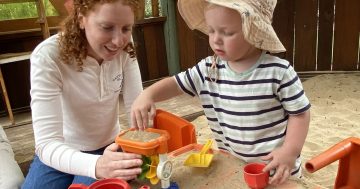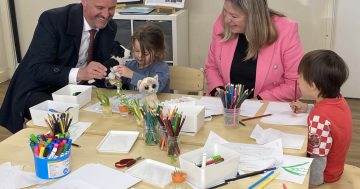
Early childhood educators have been given a boost from the Federal Government with a phased 15 per cent pay rise starting in December. Photo: File.
Early childhood education workers will get a 15 per cent pay rise to be phased in over the next 16 months. The first of two stages starts in December.
The Federal Government will fund the wages hike as part of a $3.6 billion push to shore up the sector which is suffering from serious staffing shortages.
The workers will get a 10 per cent pay rise this December and a further five per cent increase from December 2025.
The money will be distributed via grants to early childhood education centres which will pass it on to their workers.
But centres will not be able to increase their fees by more than 4.4 per cent over the next year if they want to be eligible for the funding.
The method ensures staff get fairer wages without costs being passed on to families who use the centres’ services.
The wage increase will also go to early childhood educators providing services outside school hours.
Prime Minister Anthony Albanese said the money recognised early educators shaped and changed lives.
“We can never thank them enough for what they do, but we can make sure they are properly valued and fairly paid,” Mr Albanese said.
He said the sector was heavily dominated by female workers and this initiative should encourage more women to re-enter the workforce.
“This will be a benefit for childcare workers, a benefit for families and a boost to our economy,” he said.
“A 15 per cent wage increase, 10 per cent on December 1 of this year, will mean an increase of over $100 for the wages of childcare workers. A further five per cent increase in December next year means the total benefit will be over $150.
“And importantly, it will make sure there’s a cap on any increase in the fees for families who have their young Australians in child care. This is so important.
“It will make sure by looking after workers who look after our youngest Australians in out-of-school hours care will benefit as well.
“Childcare workers aren’t just minders. They care for our young kids and educate them. The human brain develops so much in the first five years, and this is such an important announcement.”
Education Minister Jason Clare said any centre that didn’t sign on to the initiative would lose their staff to “centres around the corner” that could pay more.
“Through a legally enforceable agreement we’ll provide this money as a grant, and centres and providers will need to make sure they’ve got the necessary industrial instrument registered with the fair work commission to make all of that happen,” Mr Clare said.
“The childcare debate is over. It’s not babysitting. It’s early education and it’s critical to preparing children for school.
“A pay rise for every early childhood educator is good for our workforce, good for families and good for our economy.”
Early Childhood Education Minister Anne Aly described the announcement as a “wonderful outcome for a highly feminised workforce” that had for far too long been neglected and taken for granted.
“Properly valuing the early childhood education and care workforce is crucial to attracting and retaining workers and vital to achieving the quality universal early learning sector Australian families deserve,” she said.
The news has been widely welcomed by the sector and those campaigning for better outcomes for early childhood education workers.
Jay Weatherill from Minderoo Foundation’s Thrive by Five campaign said the changes were a win for children, families, educators and employers.
“Early childhood educators are the backbone of the early learning sector but for far too long they have been scandalously underpaid and under-recognised,” Mr Weatherill said.
“They guide children’s learning in those important years before school, when 90 per cent of brain development occurs.
“They give parents the flexibility to go back to work, earn an income and contribute to the economy. They are essential workers in every sense of the word.
“Better, fairer pay will help keep educators in the sector and attract new people to the profession. This is the crucial step towards the Prime Minister’s stated vision of a universal early childhood education system.”
Advocacy group The Parenthood also welcomed the announcement as good news for educators and for parents struggling with the cost of living.
CEO Georgie Dent said it was also a big step for gender equity because women staffed more than 90 per cent of the sector.
“This has been decades in the making and is a victory for every early childhood educator and teacher – past, present and aspiring, as well as children and families,” Ms Dent said.
“It is also momentous for gender equity as it directly addresses the chronic undervaluing of a highly feminised workforce, and bolsters a critical enabler of women’s workforce participation.”






















